by John Copley
(ANNews) – In a recent interview leading up to the June 21 Summer Solstice and National Indigenous Peoples Day (NIPD), Alberta’s Minister of Indigenous Relations, Richard Feehan spoke about some of the accomplishments his ministry has made during the past several years and what he hopes to see as we move into the future.
“I can tell you that in the past few years we have worked really hard on moving things forward in our relationship with the Indigenous peoples in this province, and we’ve had some pretty great successes,” assured Minister Feehan. “We’ve been following up on the recommendations of the TRC and UNDRIP (United Nations Declaration on the Rights of Indigenous Peoples) and from that have laid out some pretty clear plans about how we move forward. For example, to date we have put $100 million into improving water conditions on reserves. We are the first province to say, ‘we are not waiting on the federal government, we’re putting our money where our mouth is’ and we’ve been working with numerous communities to do just that.”
Minister Feehan noted that “this summer we’ll have completed both the Paul Band and Alexis Nation; they will soon be connected to their regional water systems. We are very proud of this accomplishment and we are already talking to a lot more communities and deciding on the best approach, but the money (to complete the work) is already in place so we know it’s going to happen.
“Other progress is being made this year as we continue to move ahead with our very successful work in the area of the Indigenous Climate Leadership Program and the seven different programs you can apply to. In the last year we have completed 125 projects around the Province of Alberta. The full range of those projects include everything from training Chiefs and Councillors and Metis leaders, enabling them to do full assessments on community buildings and structures, and make decisions on how to be retrofit or make improvements to structures in their communities. A lot of those improvements and retrofits are already taking place. So far more than 30 communities are either putting up solar panels in their community or getting ready to do so. With good weather in the forecast we expect to see a lot more progress being made on these projects in the next couple of months.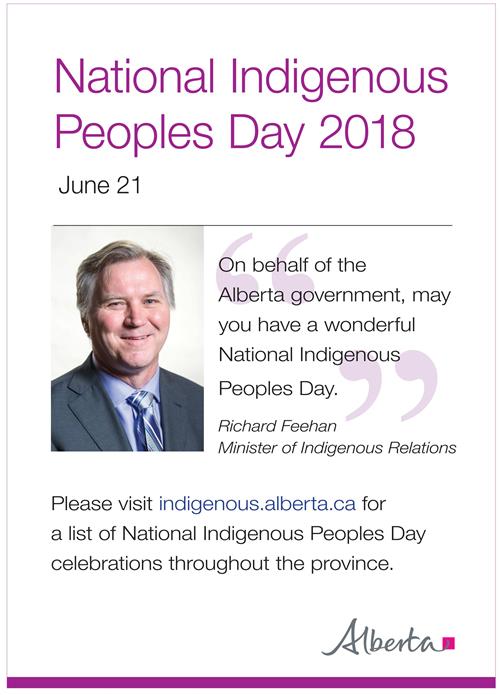
“We’ve also had a good number of First Nations and Métis Settlements participate in some of the training programs so people can learn how to work on relabels, particularly solar power panels and retrofit programs. The big cap to that, of course, is the Rep program for the Alberta energy market where we’ve made a determination that the only way anyone can bid into Rep 2 is if they have Indigenous equity participation in their proposal and in their contract. That’s a big change because it isn’t like just getting jobs, you’re now in the boardrooms and deriving benefits from the projects financially and through employment, but you are also making the decisions and that’s a huge success. We’ll be making an announcement about which communities are successful in the fall of this year but the project is well on its way; it’s been designed and we’re making sure that there is support for communities, including financial support and other kinds of assistance. By fall we will be in a place where Indigenous people in this province own a significant piece of the energy market in this province.”
Minister Feehan went on to talk about other commitments the Notley government has made and is living up to when it comes to Indigenous issues and concerns.
“One of the commitments we made was that we would train all of the public service of Alberta in terms of Indigenous history, traditions and knowledge, and that is rolling out and beginning this month. We remain committed that over the next five years we will train everybody in the public service of Alberta on this Phase One and after that we will be able to move on to deeper kinds of training. This is a very major project in terms of the number of people in this province. It’s coupled with the same thing happening in the Health Services agency and it’s also going to be coupled with the re-write of the curriculum in the school system so that every single school child from Grade 1 through Grade 12 will be learning about Indigenous history, traditions and knowledge. When this is all rolled out there’ll be hundreds of thousands of people in this province who’ll begin to have a deeper understanding about the things they need to know in order to fully appreciate the history of the Indigenous people – before contact and after (the arrival of) settlers. That’s got to make a difference because when you have people who understand each other, they work together in a much better way.”
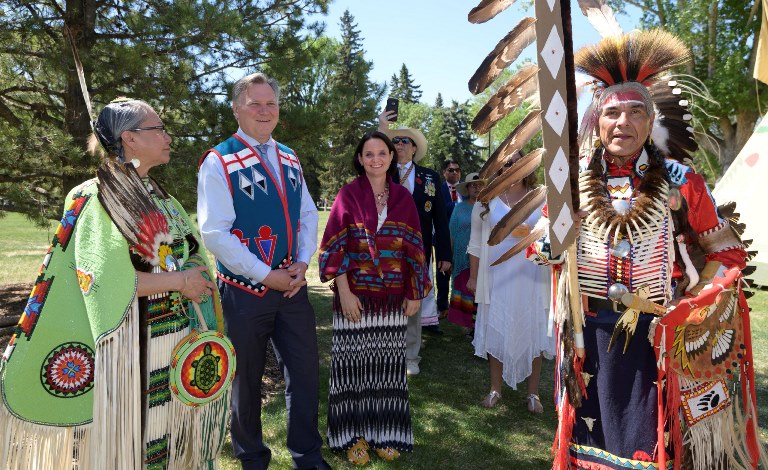
Minister Richard Feehan and Minister Danielle Larivee gather with members of the Sixties Scoop Indigenous Society of Alberta before the Grand Entry into the Alberta Legislature.
Minister Feehan said he’s proud to be involved in the precedents being set by Alberta when it comes to working in unison with and partnering with Indigenous communities and people.
“No other province has put up money to help with water problems or make across-the-board training commitments the way we have. Our climate leadership is absolutely way ahead when it comes to any other type of climate control program in the country.
“The other thing that we did this year that makes me very proud was the delivery of the apology to 60s Scoop survivors.”
The Minister spoke about the Alberta government stepping up to the plate immediately following the TRC Hearings held in Edmonton in March of 2016. One of the NDP’s first acts was to issue an apology to Indian Residential School survivors and their families.
“This was quickly made possible because the TRC had just been here and we were able to build off that. The 60’s Scoop was different so we built our own process. We worked very closely with survivors, we helped the Indigenous 60s Scoop Survivors Society and worked with them to set out the whole process of how we would work together, how we would travel around the province (to meet with survivors) and host the six sessions where more than 600 people came out and told their stories and 200 more who added their stories online. People wanted to know what the apology was for and how it would affect them.”
In an earlier interview Minister Feehan said the sessions with 60s Scoop survivors was “the mid-point in a longer journey,” noting that “people understand that an apology isn’t going to cure things and that this is somehow going to make everything better. People want us to be very clear about what we are apologizing for; not just the individual who was taken away but also for the families and communities that experienced the loss of their members. They also want to see a commitment to working with the communities to really improve things in the future.”
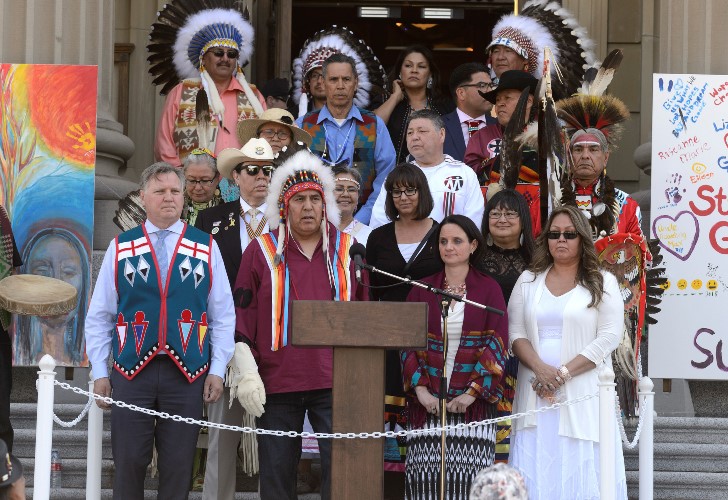
Adam North Peigan, president of the Sixties Scoop Indigenous Society of Alberta, responds to Premier Rachel Notley’s apology outside the Legislature.
Once all the kinks were ironed out and the terms of the apology were drafted, the date was set and the apology took place.
“Just a couple of weeks ago we gathered at the Alberta Legislature where we began the day in ceremony, just as we did with all of the sessions we held around the province. The Premier met with the survivors, heard their stories personally and then we had the apology in the Legislature with everyone present. The galleries were filled with survivors and of course we provided the opportunity for all of government to speak to the important steps moving forward. I believe that the apology is a significant action on behalf of this government, and really quite an accomplishment. We are also really liking the direction we are going in for next year; we’re not letting dust gather on our feet.”
The solar, training, water, curriculum are already underway and the province will be there to help shepherd them through.
“Another thing we’ve been working on the past couple of years is the consultation policy for land and resource extraction. When a company wants to come along and cut a tree or dig a hole they are first going to be talking to the First Nation or Métis community. We’ve been working very closely going nation-to-nation, one by one, to talk about what needs to change in the consultation policy. We’ve been working on three consultation policies with the communities – one for the First Nations, one for the Métis people of Alberta and one for the Métis Settlements. They will all be rolling out over the next year and by summertime, after lots of meetings and consultation, we’ll have our draft policies in place.”
Feehan said the initiatives the government has put into place during its tenure have not only been beneficial to every Albertan, they’ve helped to deliver a message: “We really do have a new relationship with the Indigenous people in this province and they are teaching us to be better at it all the time.”

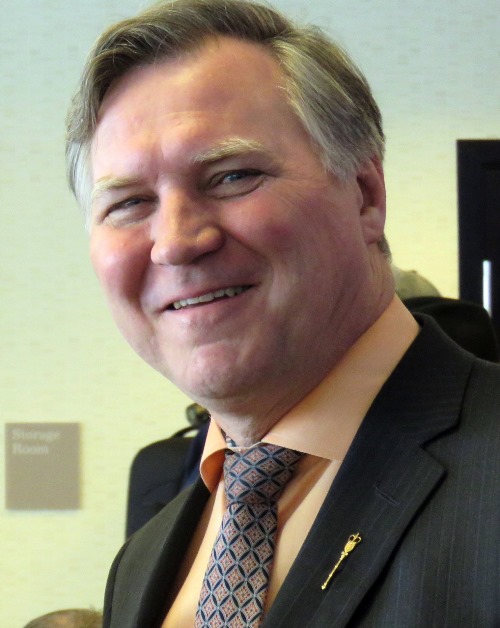


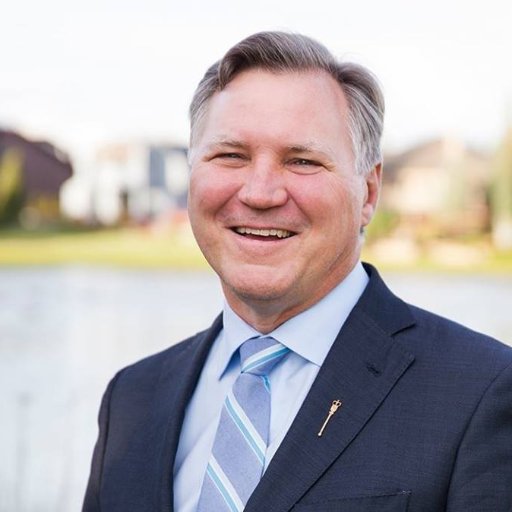
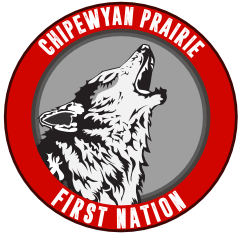
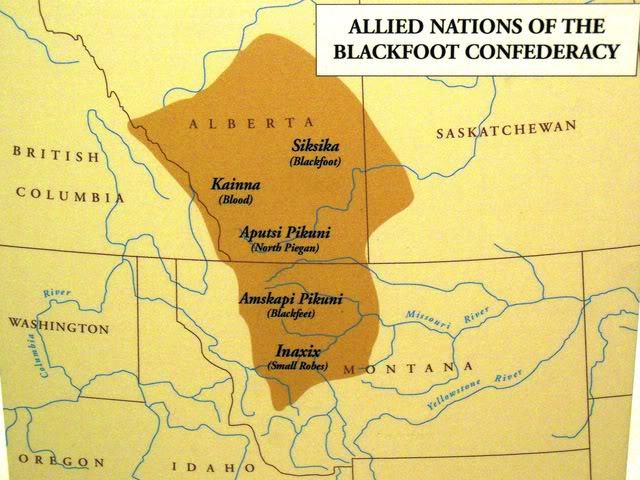
Be the first to comment on "Minister Richard Feehan affirms Alberta’s commitments to Indigenous people"